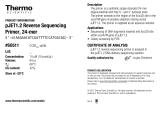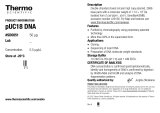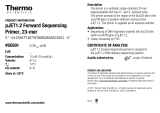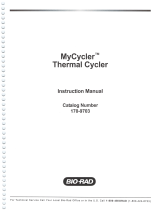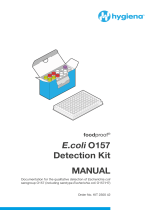Page is loading ...

PRODUCT INFORMATION
dNTP Set
,
molecular biology grade
#R0182 4 x 100 µmol
Lot: _ Expiry Date: _
Volume: 1 mL of 100 mM dATP
1 mL of 100 mM dCTP
1 mL of 100 mM dGTP
1 mL of 100 mM dTTP
Store at -20°C
www.thermoscientific.com/onebio
Description
The set consists of 100 mM aqueous solutions of dATP, dCTP,
dGTP and dTTP each supplied in a separate vial. The
nucleotide solutions are titrated to pH 7.3-7.5 with NaOH. Since
the nucleotides are provided separately, the dNTP Set offers
maximum flexibility in preparation of reaction mixes for different
applications.
Applications
For use in PCR, real-time PCR, high fidelity and long PCR,
LAMP-PCR, cDNA synthesis, RT-PCR, RDA, MDA, DNA
labeling, and DNA sequencing.
General Characteristics
dATP
C
10
H
13
N
5
O
12
P
3
Na
3
; MW = 557.2;
λmax
=259 nm;
ε
=15.4×10
3
M
-1
cm
-1
at pH 7.0;
dCTP
C
9
H
13
N
3
O
13
P
3
Na
3
; MW = 533.1;
λmax
=271 nm;
ε
=9.1×10
3
M
-1
cm
-1
at pH 7.0.
dGTP
C
10
H
13
N
5
O
13
P
3
Na
3
; MW = 573.2;
λ
max
=253 nm; ε=13.7×10
3
M
-1
cm
-1
at pH 7.0.
dTTP
C
10
H
14
N
2
O
14
P
3
Na
3
; MW = 548.1;
λ
max
=267 nm; ε=9.6×10
3
M
-1
cm
-1
at pH 7.0.
PRODUCT USE LIMITATION
This product is developed, designed and sold exclusively for research purposes and in vitro
use only. The product was not tested for use in diagnostics or for drug development, nor is it
suitable for administration to humans or animals.
Please refer to www.thermoscientific.com/onebio for Material Safety Data Sheet of the
product.
© 2013 Thermo Fisher Scientific, Inc. All rights reserved. All trademarks are the property of
Thermo Fisher Scientific, Inc. and its subsidiaries.
Rev.10
V

Important Note
Mix well each dNTP solution prior to use.
Preparation of different concentration dNTP mixtures
dNTP
mixture
to be
prepared
Volumes of dNTP Set,
µL
Water,
nuclease-
free, µL
Total volume
of dNTP
mixture, µL
100 mM
dATP
100 mM
dGTP
100 mM
dCTP
100 mM
dTTP
2 mM
of each
dNTP
10
10
10
10
460
500
100
100
100
100
4600
5000
250
250
250
250
11500
12500
10 mM
of each
dNTP
10
10
10
10
60
100
100
100
100
100
600
1000
250
250
250
250
1500
2500
25 mM
of each
dNTP
10
10
10
10
–
40
100
100
100
100
–
400
250
250
250
250
–
1000
Getting 0.2 mM dNTP in PCR
Volume of PCR
Mixture
dNTP Mixture to be added to PCR
2
mM
10
mM
25
mM
25
µL
2.5
µL
0.5
µL
0.2
µL
50
µL
5
µL
1
µL
0.4
µL
100
µL
10
µL
2
µL
0.8
µL
CERTIFICATE OF ANALYSIS
Purity is ≥99% for each dNTP, determined by HPLC.
Concentration is 100±3 mM for each dNTP, determined
spectrophotometrically.
pH is 7.3-7.5 for each dNTP, determined according to Ph. Eur.
2.2.3
Endo- and exonucleases. Each dNTP was tested by incubation of
single stranded and double stranded radiolabeled oligonucleotides
with 1 µL of 20 mM dNTP for 4 hours at 37°C and separation of
reaction mixtures on a denaturing polyacrylamide gel.
Phosphoimaging has not detected DNA degradation.
Ribonucleases. Each dNTP was tested by incubation of 2,000
bases RNA transcript with 1 µL of 20 mM dNTP at 37°C for 4 hours
and separation of reaction products on an agarose gel. There was
no decrease in RNA transcript band intensity compared to control.
Nicking activities. Each dNTP was tested by incubation of 1 µg of
supercoiled pUC19 DNA with 1 µL of 20 mM dNTP at 37°C for 17
hours and separation of reaction mixtures on an agarose gel. Neither
linearised plasmid, nor relaxation of supercoiled plasmid was detected
as compared to control.
E.coli DNA. Quantitative PCR test on ABI Prism 7000 SDS, which
uses amplification of E.coli 23S rRNA gene fragment did not detect
E.coli DNA.
Human DNA. Quantitative PCR test on ABI Prism 7000 SDS,
which uses amplification of human genomic DNA fragment did not
detect human DNA.
Functional test. 1. PCR amplification of a single-copy gene
fragment (1 kb) from 10 copies of human genomic DNA using Pfu
DNA polymerase.
2. PCR amplification of 5 kb DNA fragment from series of
lambda DNA dilutions using Pfu DNA polymerase.
Quality authorized by: Jurgita Zilinskiene
/


